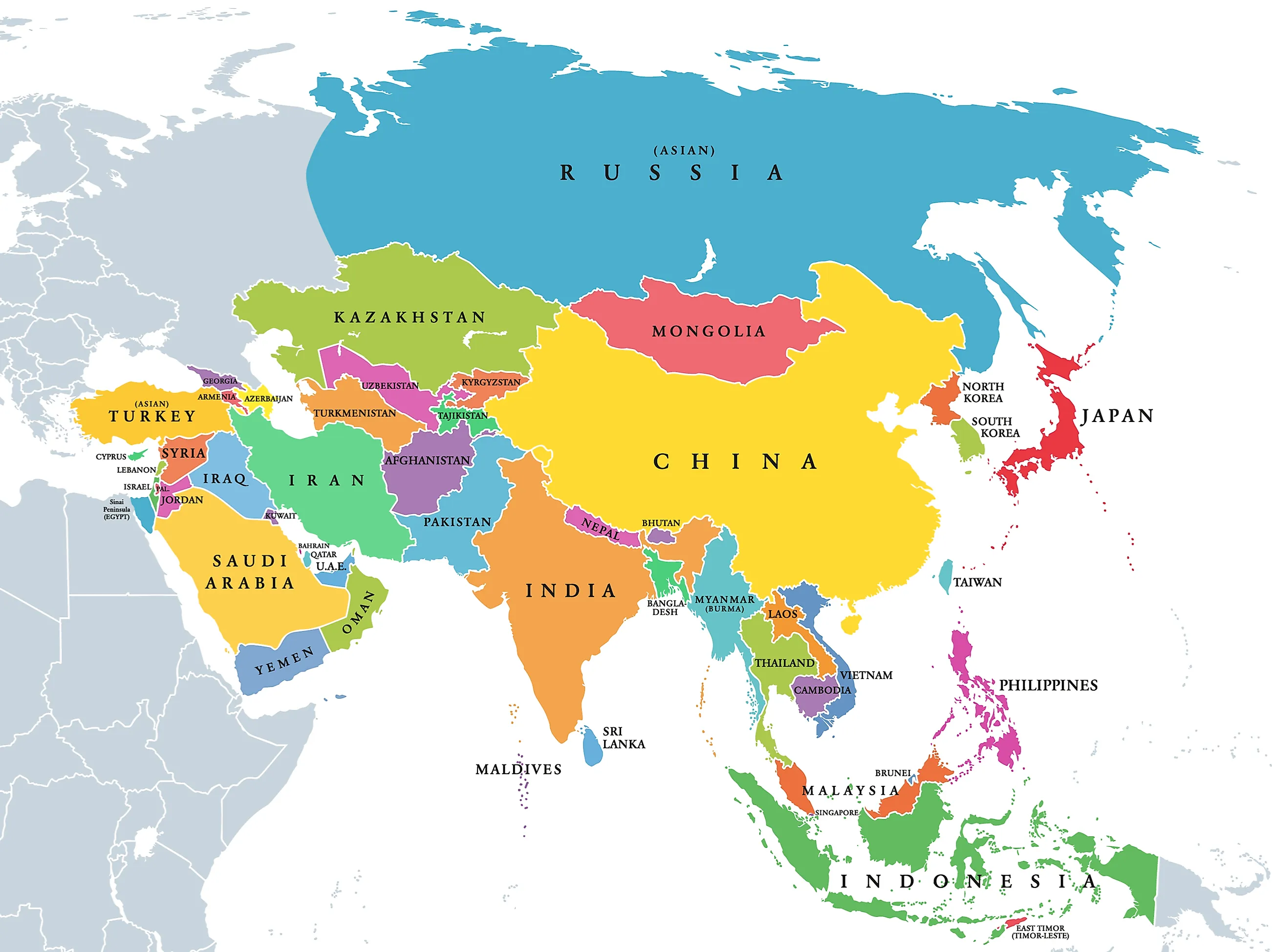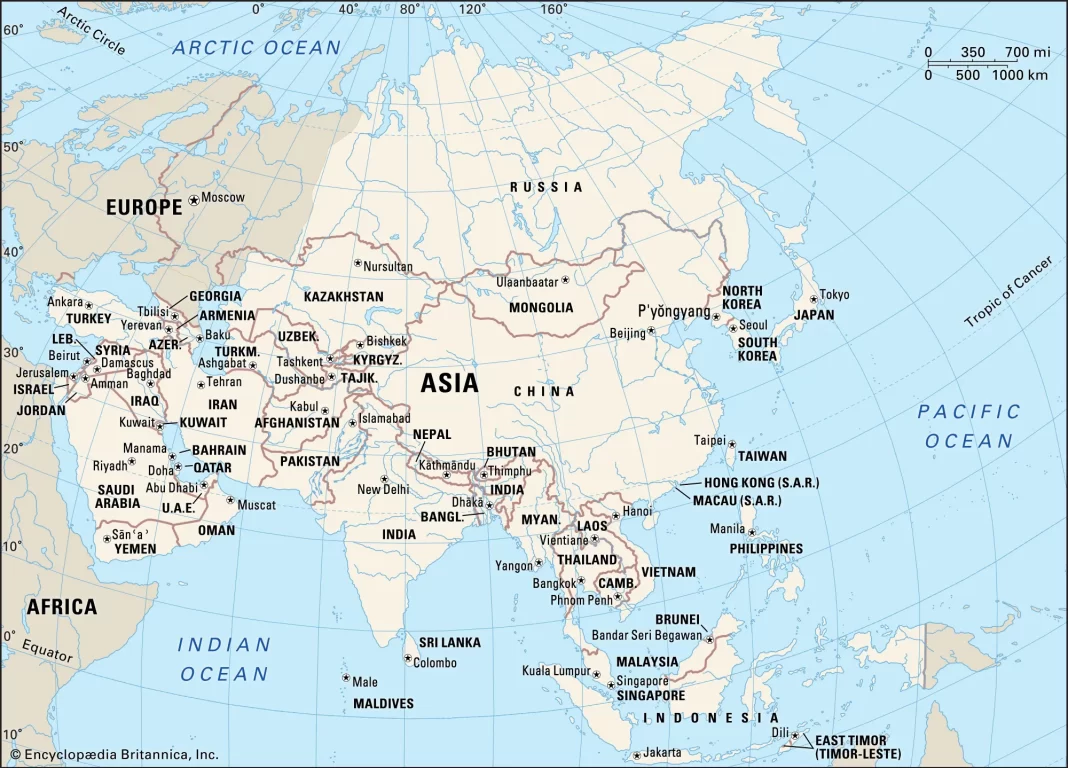“Asia” is a vast and diverse continent with a rich history, diverse cultures, and a wide range of geographic and socio-political features. Here are some key points related to Asia is the largest continent in the world and is home to numerous countries. Here is a list of Asian countries: About Geography of Asia एशिया का इतिहास
- Afghanistan
- Armenia
- Azerbaijan
- Bahrain
- Bangladesh
- Bhutan
- Brunei
- Cambodia
- China
- Cyprus
- Georgia
- India
- Indonesia
- Iran
- Iraq
- Israel
- Japan
- Jordan
- Kazakhstan
- Kuwait
- Kyrgyzstan
- Laos
- Lebanon
- Malaysia
- Maldives
- Mongolia
- Myanmar (Burma)
- Nepal
- North Korea
- Oman
- Pakistan
- Palestine (State of Palestine)
- Philippines
- Qatar
- Russia (partly in Asia)
- Saudi Arabia
- Singapore
- South Korea
- Sri Lanka
- Syria
- Taiwan (officially known as the Republic of China)
- Tajikistan
- Thailand
- Timor-Leste (East Timor)
- Turkey (partly in Asia)
- Turkmenistan
- United Arab Emirates
- Uzbekistan
- Vietnam
- Yemen

Geography: Asia is the largest continent in the world, both in terms of land area and population. It spans over 17 million square miles and is home to over 4.6 billion people, making up more than half of the world’s population. It includes a wide variety of landscapes, from the deserts of the Middle East to the Himalayan mountain range in South Asia. Countries: Asia is home to numerous countries, each with its own unique culture, language, and history. Some of the most populous countries in Asia include China, India, Indonesia, Pakistan, and Bangladesh.
Cultures: Asia is known for its incredible cultural diversity. It is the birthplace of many major religions, including Hinduism, Buddhism, Islam, and Confucianism. Asian cultures have produced some of the world’s most renowned art, music, literature, and philosophy. Economies: Several Asian countries, such as China, Japan, and South Korea, have some of the world’s largest and most dynamic economies. Asia has seen rapid economic growth in the 20th and 21st centuries, becoming a major driver of the global economy.
Political Issues: Asia has its share of political challenges. Tensions and conflicts persist in various regions, including the Kashmir dispute between India and Pakistan, the South China Sea territorial disputes, and the ongoing Israeli-Palestinian conflict in the Middle East. Technology and Innovation: Asian countries, particularly China, Japan, and South Korea, have made significant contributions to technological innovation. China, for instance, has become a major player in fields like artificial intelligence, e-commerce, and telecommunications.
Cuisine: Asian cuisine is celebrated worldwide. Dishes like sushi, dim sum, curry, and stir-fry have become popular in many parts of the world. Each region in Asia has its own culinary traditions and flavors. Languages: Asia is home to a wide array of languages, with some of the world’s most spoken languages, including Mandarin Chinese, Hindi, and Arabic. Language diversity in Asia is immense, with thousands of languages spoken across the continent.
Tourism: Asia attracts millions of tourists each year. Tourist destinations include the Great Wall of China, the Taj Mahal in India, the temples of Angkor Wat in Cambodia, and the beautiful beaches of Thailand. Environmental Challenges: Asia faces significant environmental challenges, such as air pollution, deforestation, and water scarcity. Climate change poses a major threat to many Asian countries, with rising sea levels affecting low-lying areas.
Healthcare: Asia has a diverse healthcare landscape, ranging from advanced medical facilities in countries like Japan and Singapore to regions with limited access to healthcare services. Traditional medicine, such as Ayurveda in India and Traditional Chinese Medicine, also plays a significant role in the region. Asia’s complexity and diversity make it a fascinating and important part of the world with a multitude of stories, cultures, and histories to explore. It continues to play a pivotal role in global politics, economics, and culture.
About Geography of Asia About Geography of Asia एशिया का इतिहास About Asia in hindi Asia related information Asia related information About Asia in hindi

